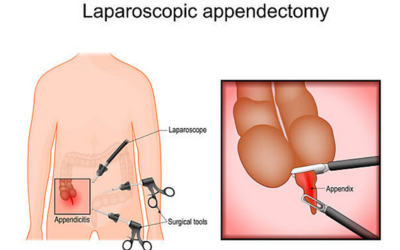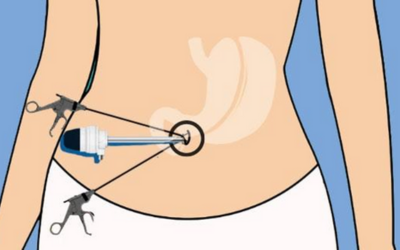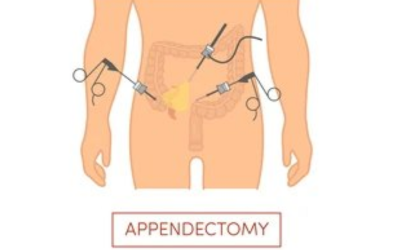Appendix Treatment in Jayanagar, Bangalore
Appendicitis is one of the most common surgical emergencies, affecting approximately 1 in 15 people at some point in their lives. It typically begins with sudden abdominal pain, often around the navel or lower right side, and can escalate quickly if not treated in time. When the appendix becomes inflamed, timely intervention becomes not just important—but lifesaving.
Dr. Rajeev Premnath stands out as a trusted expert in appendix treatment in Jayanagar, Bangalore, combining more than 19 years of surgical experience with a deep commitment to patient safety and comfort. A leading General and Laparoscopic Surgeon, he is the Head of Day Care Surgery at the Ramakrishna Group of Hospitals, where he has developed advanced protocols for managing appendicitis through minimally invasive techniques.
Dr. Rajeev specializes in laparoscopic appendectomy, including cutting-edge approaches such as Single Incision Laparoscopic Surgery (SILS), offering patients quicker recovery, reduced scarring, and shorter hospital stays. His diagnostic precision and surgical skill have helped hundreds recover safely from both uncomplicated and complex cases of appendicitis.
“Appendicitis rarely gives a second warning. Recognizing the symptoms early and acting fast is the key to preventing complications,” says Dr. Rajeev Premnath. “Our approach is always to balance safety with minimal invasiveness, so patients heal faster and better.”
Here’s how an accurate diagnosis lays the foundation for timely treatment.
Diagnostic Process for Appendicitis by Dr. Rajeev Premnath
Dr. Rajeev Premnath employs a structured, evidence-based diagnostic framework for appendicitis, combining clinical examination with advanced imaging. Patients presenting with symptoms like lower right abdominal pain, nausea, fever, or loss of appetite undergo a thorough physical assessment.
Diagnostic steps often include:
Clinical scoring systems like the Alvarado Score to support the diagnosis
By integrating these tools, Dr. Rajeev ensures that only those with confirmed or highly probable appendicitis are guided toward surgery, thereby reducing unnecessary procedures and ensuring focused treatment.
Let’s delve into who truly needs appendix surgery.
Who Is an Ideal Candidate for Appendix Surgery?
While appendicitis can affect individuals across all age groups, not every case warrants immediate surgery.
Candidates for appendix surgery generally include:
Patients diagnosed with acute appendicitis showing signs of inflammation or infection
Those with complicated appendicitis (e.g., abscess or perforation) needing urgent intervention
Individuals with recurring abdominal pain due to chronic appendicitis
Children and elderly patients who exhibit atypical but concerning symptoms
Dr. Rajeev Premnath also carefully evaluates co-existing medical conditions to ensure the procedure is timed and tailored for safety and effectiveness. In certain cases, especially where an abscess is present, initial antibiotic therapy may be advised before surgical removal.
This careful selection process prevents overtreatment while safeguarding high-risk patients.
Read on to know the different techniques used for appendix surgery.
Advanced Appendix Treatment Options Offered by Dr. Rajeev Premnath
For patients requiring surgical intervention, Dr. Rajeev Premnath offers a range of state-of-the-art appendix treatment options designed to minimize invasiveness, reduce scarring, and accelerate recovery.
Key surgical procedures include:

Laparoscopic Appendectomy: A minimally invasive approach using 2–3 small incisions, offering faster healing, less post-operative pain, and lower infection risk.

Single Incision Laparoscopic Surgery (SILS): A cutting-edge technique performed through a single umbilical incision, resulting in virtually no visible scarring.

Open Appendectomy: Reserved for complex or ruptured cases where a wider surgical field is needed for safe removal and decontamination.
Each method is chosen based on the individual’s clinical profile, severity of appendicitis, and overall health status. Dr. Rajeev’s proficiency with laparoscopic appendectomy ensures that most patients return to routine activities within a few days.
No two patients are alike—and neither should be their surgical plan.
Personalized Surgical Approach to Appendix Care by Dr. Rajeev Premnath
Dr. Rajeev Premnath’s approach to appendix surgery integrates multiple patient-specific factors, such as:
Age and fitness level
Presence of comorbidities like diabetes or hypertension
Before surgery, every patient undergoes detailed counseling to understand the procedure, recovery expectations, and lifestyle adjustments. Post-operatively, recovery plans are custom-crafted with early mobility, pain management, and diet progression schedules.
This tailored pathway is especially valuable for working professionals, students, and senior citizens who require minimized downtime. Dr. Rajeev also ensures that family members are included in the care discussions, reinforcing emotional support and informed decision-making.
Here’s what makes him the preferred choice for appendix treatment.
Why Choose Dr. Rajeev Premnath for Appendix Treatment in Jayanagar, Bangalore?
Over 19 years of surgical experience: A deep foundation in general and laparoscopic surgery
Head of Day Care Surgery: Leading short-stay surgery protocols at Ramakrishna Group of Hospitals
Global training: Exposure to best practices from Italy, Germany, and France
Quick recovery goals: Focus on same-day discharge and return-to-work timelines
Trusted reputation: Hundreds of successful laparoscopic appendectomy procedures with minimal complication rates

Frequently Asked Questions
1. Is laparoscopic appendectomy painful?
The procedure is performed under general anesthesia, so patients do not feel pain during surgery. Post-operatively, mild discomfort is expected but is effectively managed with medication.
2. How soon can I resume daily activities after surgery?
Most patients return to non-strenuous daily routines within 3–5 days after a laparoscopic appendectomy. Full recovery usually takes about 1–2 weeks.
4. Can appendicitis be treated without surgery?
In select cases of uncomplicated appendicitis, antibiotics may be tried initially. However, surgery remains the definitive and more reliable solution to prevent recurrence.
5. Will I have visible scars after laparoscopic surgery?
Scars are minimal and often barely noticeable. With SILS, there may be no visible scar at all, as the incision is hidden in the navel.
Disclaimer: This page is for informational purposes and not for promotional use.



